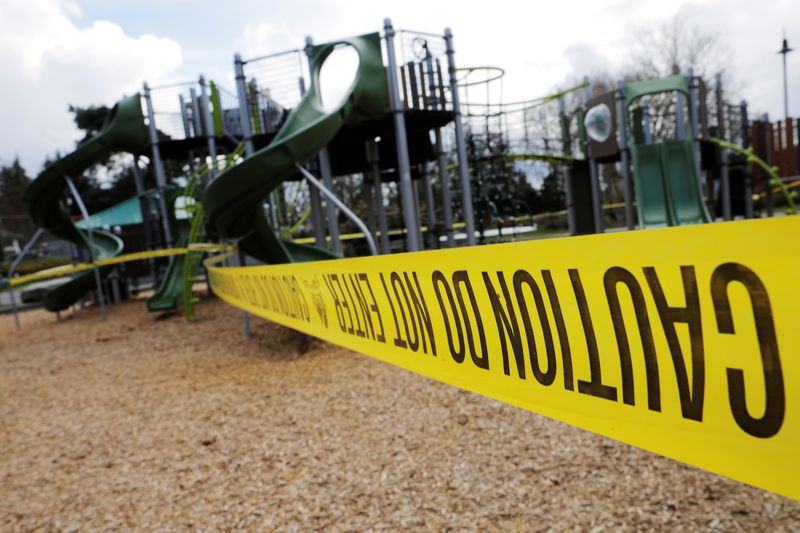By Chris Kahn
NEW YORK (Reuters) - Seven in 10 Americans now consider the coronavirus pandemic to be "a serious threat to me and my family," according to a Reuters/Ipsos opinion poll that shows how wide, bipartisan segments of the country feel their lives have been turned upside down by the health crisis.
The March 18-24 poll, released on Tuesday, found that 68% of U.S. adults agreed that the virus was a serious existential threat, up 14 percentage points from a similar poll that ran last week. This includes majorities of Democrats and Republicans, whites, minorities, young, old, urban, suburban and rural residents.
The findings reveal how the United States, which for years has been sharply divided politically over almost every major issue, has come together on at least one topic. Just last week, 63% of Democrats and 49% of Republicans said they considered the coronavirus to be a personal threat; now 76% of Democrats and 63% of Republicans feel the same way.
Americans continue to be divided over their trust in President Donald Trump and the federal government's efforts to control the spread of coronavirus, however.
Fifty-three percent of Americans say they think the federal government is doing a good job responding to the outbreak, which is up 3 points from last week. Another 41% said they do not think the government is doing a good job.
Trump's overall approval numbers did rise slightly to 44% over the past few weeks, but at 4% it was a modest rise for a president confronting a national crisis. Former President George W. Bush's approval rating shot up by 39 points to 90% in the days following the Sept. 11, 2001, attacks, according to Gallup polling service.
The Reuters/Ipsos poll was conducted after many Americans have seen their lives transformed almost overnight as health officials struggle to contain the virus. Nearly 50,000 people are known to have been infected with COVID-19 in the United States, and more than 600 people have died.
There are now cases in all 50 states, and the rapid spread of the illness, combined with the lack of testing kits and other protective equipment, has led many states and communities to shutter non-essential businesses, require residents to stay at home and ban large gatherings.
The online poll of 4,428 U.S. adults showed just how much people's lives have changed over the last few weeks.
The poll found that 33% now think it is "very" or "somewhat" likely that they will be infected with the virus within the next year, up 5 points from last week.
More than half of the country - 53% - say the coronavirus has directly impacted their place of business, up 7 points from last week. And 40% believe that the virus will have a "long-term negative impact" on the economy.
Among those parents who have children at home, 52% are now keeping their kids out of school because of the coronavirus, up from 37% last week.
Sixty-seven percent of Americans say they are now washing their hands more frequently, which is up 7 points from last week, and 61% are practicing "social distancing" by avoiding physical contact with others, up 10 points from a week ago.
One out of three Americans say they are now avoiding public transportation, and one in three say they have canceled or changed their travel plans to avoid the virus. About 24% said they are now working from home, up 8 points from last week.
Still, a sizable minority of Americans appear to disbelieve warnings from public health officials about the seriousness of the outbreak.
Roughly one in five Americans strongly agreed that people are panicking unnecessarily, that the virus is mostly a problem for people who live in urban areas, and that the crisis has been exaggerated by the media.
About one in 10 said they have not altered their daily routine in any way in response to the coronavirus.
When it comes to the economy, American opinion is sharply divided along party lines, with 66% of Republicans saying that it is still going in the right direction, and 68% saying they think the coronavirus will have only a short-term impact.
Among Democrats, 74% think the economy is on the wrong track and 57% believe the virus will have a long-term economic impact.
The Reuters/Ipsos poll was conducted online, in English, throughout the United States. It has a credibility interval, a measure of precision, of about 2 percentage points.

Click here to see the full poll results: https://reut.rs/2JbXeVB and https://reut.rs/3aibesK